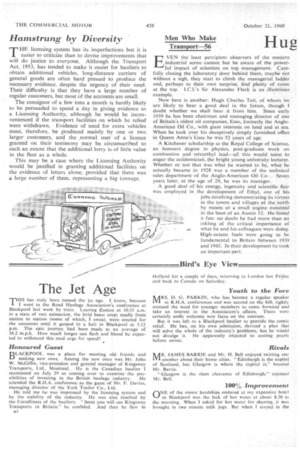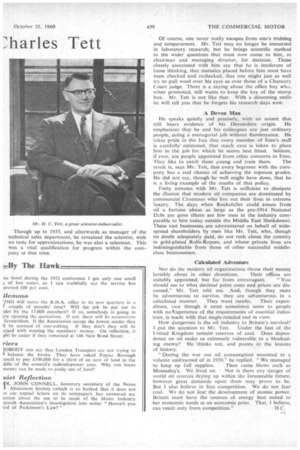Men Who Make Transport-56
Page 38

Page 39

If you've noticed an error in this article please click here to report it so we can fix it.
Hug harles Tett
F.41/EN the least percipient observers of the modern industrial scene-cannot but be aware of the powerful impact of scientists on top management. Carefully closing the laboratory door behind them, maybe not without a sigh, they start to climb the managerial ladder and, perhaps to their own surprise, find plenty of room at the top. I.C.I.'s Sir Alexander Fleck is an illustrious example.
Now here is another: Hugh Charles Tett, of whom we are likely to hear a good deal in the future, though I doubt whether we shall hear it from him. Since early 1959 he has been chairman and managing director of one of Britain's oldest oil companies, Esso, formerly the AngloAmerican Oil Co., with giant interests on land and at sea. When he took over his deceptively simply furnished 'office in Queen Anne's Gate he was 52 years of age.
A Kitchener scholarship at the Royal College of Science, an honours degree in physics, post-graduate work on combustion and tetraethyl lead—all this would seem to augur the acidemician, the bright young university lecturer. Whether or not that was what he wanted to be, what he actually became in 1928 was a member of the technical sales department of the Anglo-American Oil Co. . Seven years later, at the age of 29, he was its manager. .
A good deal of his energy, ingenuity and scientific flair was employed in the development of Ethyl, one of 'his jobs involving demonstrating its virtues in the towns and villages of the north by means of a small engine mounted in the boot of an Austin 12. He found it fun: no doubt he had more than an inkling of the critical importance of .. what he and his colleagues were doing. High-octane fuels were going to be fundamental to Britain between 1939 and 1945. In their development he took an important part. Though up to 1935. and afterwards as manager of the technical sales department, he remained the scientist, with no taste for approximations, he was also a salesman. This was a vital qualification for progress within the company at that time. • Of course, one never really escapes from one's training and temperament. Mr. Tett may no longer be immers'ed in laboratory research; but he brings scientific method to the wider questions that must now come to him, as chairman and managing director, for decision. Those closely associated with him say that he is intolerant of loose thinking, that statistics placed before him must have been checked and rechecked, that one might just as well try to pull wool over his eyes as over those of a Chancery Court judge. There is a saying about the office boy who, when promoted, still wants to keep the key of the stamp box. Mr. Tett is not like that. With a disarming smile he will tell you that he forgets his research. days now.
A Devon Man He speaks quietly and precisely, with an accent that still bears evidence of his Devonshire origin. He emphasizes that he and his colleagues are just ordinary people, doing a managerial job without flamboyance. He takes pride in the fact that every member of Fsso's staff is carefully estimated, that much care is taken to place him in the job for which he seems best fitted. Seldom, if ever, are people appointed from other concerns to Esso.
They like to catch them young and train them. The result is, says Mr. Tett, that every beginner with the company has a real chance of achieving the topmost grades. He did not say, though he well might have done, that he is a living example of the results of that policy.
Forty minutes with Mr. Tett is sufficient to dissipate the illusion that modern oil companies are dominated by commercial Croesuses who live out their lives in extreme luxury. The days when Rockefeller could amass from oil a fortune about as large as the pre-1914 National Debt are gone (there are few men in the industry comparable to him today outside the Middle East Sheikdoms). These vast businesses are administered on behalf of widespread shareholders by men like Mr. Tett, who, though no doubt adequately paid, do not rush about the country in gold-plated Rolls-Royces, and whose private lives are indistinguishable from those of other successful middleclass businessmen.
Calculated Adventure Nor do the modern oil organizations throw their money lavishly about in other directions. Their offices are suitably appointed, but far from extravagant. "You should see to what decimal point costs and prices are discussed," Mr. Tett told me. And, though they must be adventurous to survive, they are adVenturous in a
calculated manner. They want results. Their expenditure, vast though it. must sometimes seem to people with no experience of the requirements of essential industries, is made with that single-minded end in view.
How dangerous is the oil industry to Britain's survival?
I put the question to Mr. Tett. Under the feet of the United Kingdom remain' reserves of coal. Does dependence on oil make us extremely vulnerable tO a blockading enemy? He 'thinks not, and points to the lessons of history.
"During the war our oil consumption "mounted to a volume undreamed of in 1939," he replied. "We managed to keep up full supplies. Then came blows such as Mossadeq's. We lived on. Nor is there any danger of
world oil sources drying up within the foreseeable future, however great demands upon them may prove to be. But I also believe in free competition. We do not fear coal. We do not fear the development of atomic power. Britain must have the sources of energy best suited to her economic needs at an economic price. That. I believe,
can result only from competition." H.C.




















































































































